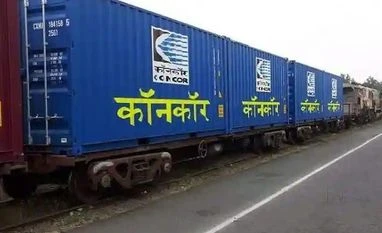The Ministry of Railways in its latest circular has clarified several tenets of land management that can directly impact the lease terms of the Railways’ landholders, including divestment-bound Container Corporation of India (CONCOR).
The circular dated October 4 -- titled ‘Policy for Management of Railway Land’ — also offers details about various terms of the new land lease policy (LLF), which was approved by the Union Cabinet last month. It states that existing landholders can extend their lease for another 35 years. The circular has been reviewed by Business Standard.
Addressing the existing lease/licence holders of terminals/private sidings/private freight terminals, the circular said: “All entities using railway land for cargo activities will continue to be governed by the Railways’ extant policies, i.e annual lease/licence charge @6 per cent of ‘market value of land’ with an annual escalation of 7 per cent for the remaining lease period or 35 years or period mutually decided, whichever is earlier.”
On September 7, the Cabinet Committee on Economic Affairs (CCEA) had approved the proposal to lower LLF rates to 1.5 per cent of the value of land, from 6 per cent. The annual escalation in fee was lowered to 6 per cent, from the earlier 7 per cent. The decision was made to incentivise private investment in the Railways’ land.
Union Railways minister Ashwini Vaishnaw had then said that competitive bidding would be required at the end of the lease period but the existing holders would have the right of first refusal. Under the right of first refusal, they can simply match the highest bid and get that land again.
The circular further said the existing entities shall be given the option to migrate to the new policy regime on a transparent competitive bidding process as applicable for new cargo terminals, provided there are no outstanding dues.
The latest circular, industry executives say, has offered much needed clarity with regards to the lease terms of CONCOR. The market had mixed reactions to the LLF policy as there was speculation of CONCOR getting devalued as it may lose establishments on railway land if it enters a fresh bidding process. The logistics major has close to 30 container terminals on the Railways’ land, and is said to have a virtual monopoly due to those assets. Analysts at brokerages previously said that the new policy is neutral to negative for CONCOR.
The circular said: “If the existing entities operating cargo terminals, sidings, goods sheds, etc, do not want to avail the option of shifting to new cargo terminal policy under the transparent competitive bidding process, then these existing entities will be permitted to enter into a new lease agreement at 6 per cent annual lease charges, with an annual escalation of 7 per cent.”
However, the decision to continue with the existing regime is for CONCOR to decide.
Industry executives said the current circular gives clarity on existing players operating on the Railways’ land, which was not explained in the Cabinet decision. “This was a major roadblock in privatisation of CONCOR as bidders wanted clarity on the matter. Through the circular, the existing players can renew their land lease and continue with the same rates without any uncertainty. This renewal can be for 35 years,” said an executive.
The Centre currently holds a 54.8 per cent stake in CONCOR and plans to sell 30.8 per cent of the company as part of its privatisation drive. At current levels, the stake sale will fetch the Centre upwards of Rs 13,000 crore.
A senior Railways official said that several other PSU land holdings, such as godowns of the Food Corporation of India (FCI) and sidings under the Ministry of Coal, along with several commercial establishments under other Railway PSUs, such as Indian Railway Catering and Tourism Corporation (IRCTC), would benefit from this move. These firms will now be able to extend their tenure by signing a fresh lease on older rates and hold on to their assets, which are vital links in their operations, such as transportation of foodgrain, and coal, among others.
Earlier, the lease period for private players was capped at five years, while that for PSUs, such as CONCOR, was up to 35 years. Under the new LLF policy, this period has been made uniform for both parties — 35 years. The official added that the move was undertaken to ensure that state-owned firms, which make up the bulk of current leaseholders, do not have to suffer from sudden volatility after their lease periods are over.
What it means
- Existing leaseholders of land can choose to extend lease for up to 35 years on older LLF rates (6 per cent of land value)
- LLF policy fineprint clarifies concerns that CONCOR may lose value before privatisation as it may have to surrender land assets or face bidding competition
- Most of CONCOR’s 63 container terminals operate on railway-owned land. The PSU earlier enjoyed a 35-year lease as compared to 5 years for private players
- Ball now in CONCOR’s court on whether it chooses to shift to new policy as its container terminal lease periods ending, say experts
- CONCOR is a market leader in container logistics, partially due to several government assets; privatisation may fetch Centre Rs 13,000 crore more
Unlock 30+ premium stories daily hand-picked by our editors, across devices on browser and app.
Pick your 5 favourite companies, get a daily email with all news updates on them.
Full access to our intuitive epaper - clip, save, share articles from any device; newspaper archives from 2006.
Preferential invites to Business Standard events.
Curated newsletters on markets, personal finance, policy & politics, start-ups, technology, and more.
)